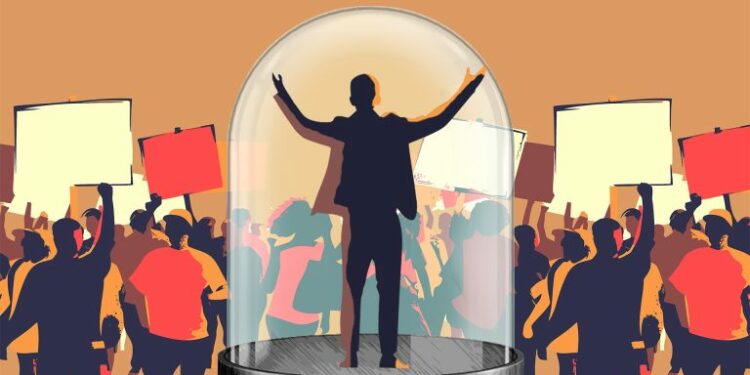#LaHoraDeVenezuela 🇻🇪🚨 | Oenegés en #Venezuela denuncian que a todos los detenidos en las protestas se les imputan los mismos cargos.
¿Cuál es el patrón? Audiencias colectivas, a distancia y sin defensa privada.
Esta nota lo explica.⬇️https://t.co/9aFOIQPyZE
— CONNECTAS (@ConnectasOrg) August 2, 2024
#LaHoraDeVenezuela | NGOs in #Venezuela report that all those detained in protests are charged with the same charges.
What is the pattern? Collective hearings, at a distance and without private defense.
This article explains it.
In recent years, other Latin American leaders have lashed out against organized civil society. Among the most discomforting examples is Mexico’s president Andres Manuel Lopez Obrador. On August 19, he criticized the fact that the US agency USAID financed the non-profit association Mexicans Against Corruption, which specializes in journalistic investigations. Pained by the accusations, LĂłpez Obrador said he wrote to his counterpart Joe Biden on the matter. LĂłpez Obrador argued:
Este proceder es completamente ofensivo y contrario a las relaciones de respeto a nuestras soberanĂas que tanto usted como yo hemos venido cultivando en bien de nuestras naciones.
This is completely offensive and contrary to the relationship of respect for our sovereignty that both you and I have been cultivating for the good of our nations.
For the Salvadoran expert in international relations Napoleón Campos, civil society generally assumes the roles of promoting human rights and citizen participation in democratic contexts. This is recognized as a valuable contribution, both by the Organization of American States (OAS) and the United Nations. However, these organizations are confronted on the ground by the interests of what Campos calls “tyrannical projects.”
#Entérate Esta semana el presidente @lopezobrador_ exhibió información fiscal de los donantes, proveedores y personal de MCCI. Durante el sexenio nuestra organización ha sido hostigada y difamada en 265 ocasiones.
Te contamos. 🎨 https://t.co/Bxzw3XgdpC pic.twitter.com/UzkYNz3Xx0
— Mexicanos Contra la Corrupción (@MXvsCORRUPCION) August 16, 2024
#Read This week President @lopezobrador_ released tax information on MCCI donors, suppliers and staff. During [his] six-year term, our organization has been harassed and smeared on 265 occasions.
We report on it.
Campos agrees with Bolivian diplomat Jaime Aparicio Otero, former president of the Inter-American Juridical Committee of the OAS. Aparicio observes that the concept of sovereignty becomes a “pretext” to attack a sector that political leaders see as a threat to their absolute control. Aparicio says:
Las organizaciones y movimientos de la sociedad suelen promover valores como la  transparencia, la rendición de cuentas, la protección del medioambiente, derechos humanos y la participación democrática. Por lo tanto, son contrarios a los intereses de un gobierno que lo que busca es concentrar el poder y prorrogarse.
Civil society organizations and movements tend to promote values such as transparency, accountability, environmental protection, human rights and democratic participation. Therefore, they are contrary to the interests of a government that seeks to concentrate power and perpetuate itself.
Aparicio points to Nicaragua, Bolivia, Cuba and Venezuela as the group of nations living under “authoritarian populism.” Though those leaders identify themselves as leftist, Jair Bolsonaro’s right-wing also persecuted NGOs in Brazil. In fact, he tried to control NGOs through a decree in 2019 and accused associations working with Amazonian peoples of “manipulating and exploiting” Indigenous communities.
Nayib Bukele in El Salvador has also attacked civil society groups. After establishing an exceptional regime to combat gangs, which gained him immense popularity with his iron fist policy, he was able to get re-elected in 2024, but democracy died in the making. Of course, the people documenting the abuses come from the ranks of civil society and independent journalism, and the government has responded with harassment and a permanent smear campaign against them on social media. For example, Bukele erupted in anger in April 2022 and accused NGOs, the media, and other political parties of being behind the “bloodshed” caused by the gangs.
The Salvadoran government has, for the moment, a bill on “foreign agents” on hold. The law proposal seeks to punish “foreign interference” and considers levying a 40 percent tax on all those civil society organizations or the media that the regime considers to be participating in politics and disrupting the peace. The law is “dormant” for now, but given Bukele’s complete control of the parliament, it could be applied at any time.
#PolĂticaSV l No archivarán Ley de Agentes Extranjeros dice presidente de Asamblea
>> https://t.co/lZzVgJHfDJ pic.twitter.com/0MJxxc1Wrr
— Diario El Mundo (@ElMundoSV) August 6, 2022
#SVPolitics l Foreign Agents Law will not be shelved, says Assembly Speaker
Bukele, seen as an ultra-right-winger, has taken positions in defense of “sovereignty” that bring him closer to the leftist Ortega. On three occasions, the Salvadoran delegation to the OAS did not endorse multilateral condemnation of abuses committed in Nicaragua. They wrote a curious footnote, in which El Salvador affirms that it does not intervene in the internal affairs of other countries.
But the concept of sovereignty has its limits. While Campos considers Bukele’s position “hypocritical,” Aparicio calls on states’ commitments to respect human rights. He said:
Respecto a la soberanĂa es bueno decir que se olvidan los paĂses latinoamericanos como MĂ©xico, Colombia y otros que, al firmar la ConvenciĂłn Americana sobre Derechos Humanos y la carta de la OEA, hay un deber de injerencia asumido por los propios Estados que trasnacionaliza la obligaciĂłn de cumplir con los derechos humanos.
Regarding sovereignty, it is worth mentioning that Latin American countries such as Mexico, Colombia and others forget that, by signing the American Convention on Human Rights and the OAS Charter, there is a duty of interference assumed by the states themselves. This transnationalizes the obligation to comply with human rights.
In Bolivia, if we review the political record of Evo Morales, he seemed bent on building the image of a sovereignty champion in Latin America. But defending this value is quite malleable in the hands of politicians. In fact, these Latin American leaders are often docile when the alleged interference comes from China, Russia or Iran. Aparicio explains that Beijing’s million-dollar investments — in technology, infrastructure and natural resources — do not stipulate any governance or human rights conditions to its partners.
For example, on October 14, 2023, Daniel Ortega praised the reestablishment of diplomatic relations with China. He said that it was a “miracle” that they now have those ties and stressed that the treatment with them is of “respect” and without “putting conditions.” It is the same modus operandi with other nations that are facing human rights violations. After all, Beijing recognized Maduro’s “victory” after “the successful organization” of elections in Venezuela, despite the fraud documented by the opposition.
Of course, it is only logical that dictators who deploy Stalinist terror against their opponents should prefer to be friends with those who do not question their behavior. Local autocrats do not like to be asked uncomfortable questions, precisely those that civil society organizations are required to ask. Hence, to a greater or lesser extent, NGOs will always find themselves in the crosshairs of repression.
Source link : http://www.bing.com/news/apiclick.aspx?ref=FexRss&aid=&tid=66f30a771995461b95c124593e28ef4b&url=https%3A%2F%2Fglobalvoices.org%2F2024%2F09%2F21%2Fsovereignty-a-pretext-for-latin-americas-autocrats-to-attack-ngos%2F&c=8974623798066951824&mkt=en-us
Author :
Publish date : 2024-09-21 03:53:00
Copyright for syndicated content belongs to the linked Source.












